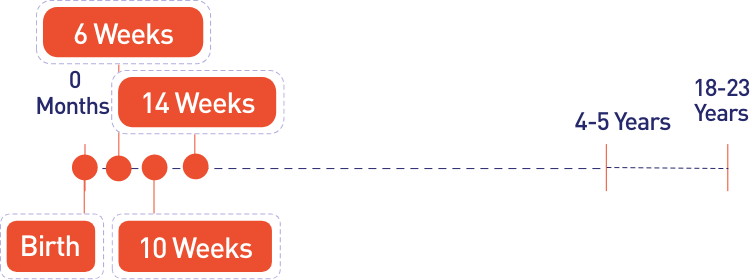No, vaccination for Hepatitis A does not offer protection against a Hepatitis B infection. It is advisable to get the Hepatitis B vaccination separately.


You are now leaving GSK’s website and are going to a website that is not operated/controlled by GSK. Though we feel it could be useful to you,we are not responsible for the content/service or availability of linked sites. You are therefore mindful of these risks and have decided to go ahead.
Agree Agree Agree Stay
Hepatitis B is an infection caused by the Hepatitis B virus that can be prevented by vaccination.
Ensuring your child's health is crucial, and 7-Star Protection offers protection through seven essential vaccinations. One of these vaccinations protects against Hepatitis B, a serious liver infection particularly harmful to young children. Symptoms include fever, fatigue, loss of appetite, nausea, vomiting, jaundice, and joint pain, potentially leading to chronic liver disease and liver cancer.
Vaccinating your child early can prevent Hepatitis B and its associated issues. With 7-Star Protection , your child is protected against Hepatitis B and other serious diseases, promoting a healthy and happy childhood."

If you miss out the dose of these vaccinations during the stipulated time, you can consult with your doctor for a Catch-up Vaccination.
Talk to your doctor about the Hepatitis B Vaccination.
Hepatitis B is a contagious viral infection caused by the Hepatitis B virus. It affects the liver and can cause acute (short-term) or chronic (long-term) illness.
The risk of developing a long-term infection is higher among children. While only 2-6 per cent of adults with a Hepatitis B infection develop a long-term illness or infection, the number can be as high as 90% among infants.
While not everyone who is infected may experience symptoms, some could face conditions such as cirrhosis (chronic liver disease) and liver cancer, which may prove fatal.
The risk of exposure to Hepatitis B starts at birth. Here are some of the common ways that one could get infected with Hepatitis B:
The virus does not spread through breastfeeding, hugging, coughing, sneezing, holding hands, or through shared utensils, food, or water.
In the initial few days of the infection, one may not experience any symptoms. People with the acute illness may experience symptoms such as:
• Jaundice (yellow skin and eyes)
• Vomiting
• Abdominal pain
• Nausea (feeling sick in the stomach, wanting to vomit)
• Fatigue (extreme tiredness or exhaustion)
• Dark urine
These symptoms may last for several weeks. In some cases, people with acute hepatitis may develop acute liver failure, which may prove fatal.
Hepatitis B vaccination schedules are very flexible, providing multiple options.
These include:
Birth, 6 and 14 weeks
Birth, 6 weeks, 6 months
Birth, 6 weeks, 10 weeks, 14 weeks
Hepatitis B vaccines are available as a standalone or in combination. In case missed, catch-up vaccination for Hepatitis B can be taken as advised by a doctor.
However, consult your doctor for more information.
Some of the most common adverse effects associated with the Hepatitis B vaccination are but not limited to:
For more details on side effects, please consult your doctor.

No, vaccination for Hepatitis A does not offer protection against a Hepatitis B infection. It is advisable to get the Hepatitis B vaccination separately.
A public awareness initiative by GlaxoSmithKline Pharmaceuticals Limited. Dr. Annie Besant Road, Worli, Mumbai 400 030, India.
Information appearing in this material is for general awareness only. Nothing contained in this material constitutes medical advice. Please consult your doctor for any medical queries, any question or concern you may have regarding your condition. The disease list indicated for vaccination is not complete, please consult your child’s Paediatrician for the complete vaccination schedule. The doctor shown in this material is being used for illustrative purpose only and is a professional model. The disease representation icons/images and animation are for illustrative purpose only.